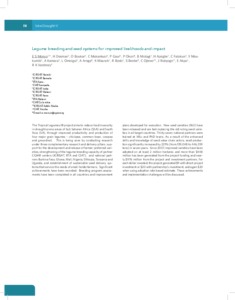Legume breeding and seed systems for improved livelihoods and impact
Abstract
The Tropical Legumes III project aims to reduce food insecurity in drought-prone areas of Sub Saharan Africa (SSA) and South Asia (SA), through improved productivity and production of four major grain legumes – chickpea, common bean, cowpea and groundnut. This is being sone by conducting research under three complementary research and delivery pillars: support for the development and release of farmer-preferred varieties; strengthening of the legume breeding capacity of partner CGIAR centers (ICRISAT, IITA and CIAT), and national partners Burkina Faso, Ghana, Mali, Nigeria, Ethiopia, Tanzania and Uganda; and establishment of sustainable seed delivery systems that service the needs of small-holderfarmers. Significant achievements have been recorded. Breeding program assessments have been completed in all countries and improvement plans developed for execution. New seed varieties (163) have been released and are fast replacing the old ruling seed varieties in all target countries. Thirty seven national partners were trained at MSc and PhD levels. As a result of the enhanced skills and knowledge of seed value chain actors, seed production significantly increased by 221% (from 139,048 to 446,359 tons) in seven years. Since 2007, improved varieties have been adopted on at least 2 million hectares and more than $448 million has been generated from the project funding and nearly $976 million from the project and investment partners. For each dollar invested, the project generated $9 with direct project investment or $20 with partnership’s investment, and again $20 when using adoption rate based estimate. These achievements and implementation challenges will be discussed

